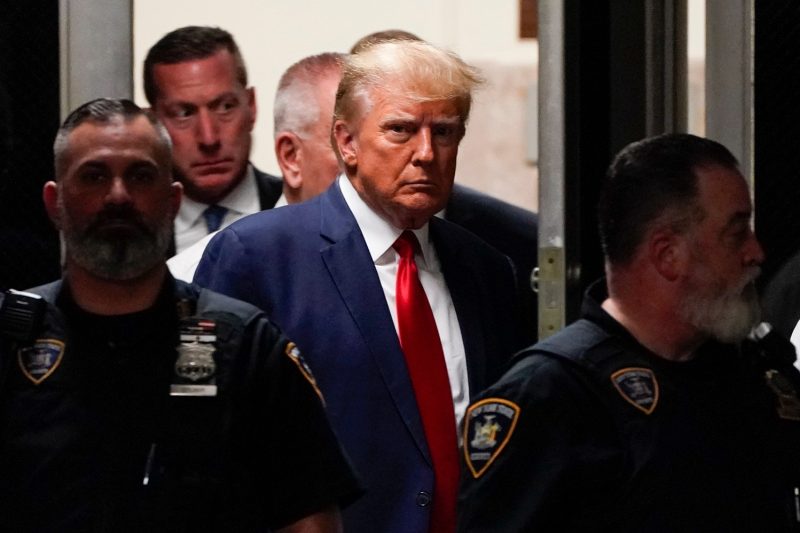
Trump’s D.C. trial removed from March calendar, clearing way for N.Y. case
Former president Donald Trump’s March 4 trial date on charges of plotting to overturn the results of the 2020 election in D.C. has been taken off the calendar, a formal acknowledgment of what has long been anticipated — that his claim of presidential immunity from criminal prosecution would delay his trial while it remains on appeal.
In an order Friday, U.S. District Judge Tanya S. Chutkan said jury selection — set to begin next week with questionnaires sent out to D.C. residents — has now been postponed indefinitely.
“The court will set a new schedule if and when the mandate is returned,” Chutkan wrote in the brief order Friday afternoon.
Chutkan has made clear since Trump filed his appeal Dec. 7 that all trial deadlines would be suspended while he challenges the case. In the appeal, Trump is arguing that the government does not have authority under the Constitution to bring charges against him for actions he took while president after the 2020 election through the Jan. 6, 2021, Capitol attack, when he attempted to prevent Congress from confirming Joe Biden’s election victory.
The delay in the D.C. case makes it increasingly likely that the first of Trump’s four criminal trials could be held this spring in Manhattan on New York state charges of business fraud in connection with hush money payments during the 2016 election. That trial has nominally been set for March 25, but the court in that case has signaled deference to Trump’s federal election subversion case. New York Supreme Court Justice Juan Merchan has scheduled a pretrial hearing in two weeks — Feb. 15 — and is expected to decide after that if the trial will go forward as planned.
How — and when — a federal appeals court panel might rule on Trump’s appeal has been a subject of feverish speculation among court-watchers attempting to decipher whether special counsel Jack Smith can bring Trump to trial before the November election.
But since Trump’s appeal paused his case, Chutkan has no authority to set a new trial schedule or impose other burdens or deadlines on the defense until higher courts respond. Chutkan has also made clear that if and when she gets the green light to set a new date, she would not set shorter deadlines that would require Trump’s attorneys to make up for lost time, suggesting the trial would be pushed back weeks if not months.
A spokesman for Smith said the office had no comment, and spokespeople for Trump and for the court did not immediately respond to requests for comment.
Trump’s other criminal cases are in South Florida, where he faces federal charges of mishandling and retaining classified documents after leaving the White House and obstructing government efforts to recover them from his Mar-a-Lago home, and in Georgia, for a state election obstruction case.
In his federal election interference case in D.C., Trump is arguing that he cannot be tried for trying to overturn the 2020 election results because he was acquitted by the Senate of inciting the 2021 Capitol attack, arguing under the constitutional principle of double jeopardy that only impeached and removed presidents can be criminally prosecuted.
A three-judge panel of the U.S. Court of Appeals for the D.C. Circuit heard oral arguments Jan. 9 after fast-tracking the case, but it has not yet issued an opinion. The dispute could go on to the full circuit court or the Supreme Court, with the prospect of a trial hanging in the balance. While ordinary criminal-case appeals must wait until after conviction, claims like Trump’s that assert a constitutional right not to face trial at all must be decided before trial, posing a key hurdle as well as a potential history-setting legal precedent.
Chutkan rejected Trump’s arguments in a Dec. 1 opinion, saying Trump’s term as president “did not bestow on him the divine right of kings to evade the criminal accountability that governs his fellow citizens.” She said his double-jeopardy impeachment claim defied the Constitution’s “plain meaning, original understanding, and common sense.”
Chutkan acknowledged before Friday that Trump’s trial would not go forward in March. On Jan. 24 she scheduled a new trial for April 2, when Trump’s projected six-to-eight-week trial would have been ongoing. On Wednesday, Chutkan set a March 18 hearing for another defendant, saying, “I suspect in March I will not be in trial.”
Chutkan’s next trial is set for July 2. The judge set that date in December, a sign that she believed Trump’s trial would be over by then.
As of at least Thursday, the March 4 trial date was dropped from a date-searchable calendar on the public website of the U.S. District Court in D.C. before Friday’s order. It was not immediately clear when it was removed. An internal master court trial calendar distributed Jan. 26 showed Trump’s trial date, suggesting the change was recent, according to a federal official who spoke on the condition of anonymity to discuss an internal document. Chutkan on Friday formally vacated the trial date in Trump’s criminal case docket.
Tom Jackman contributed to this report.
